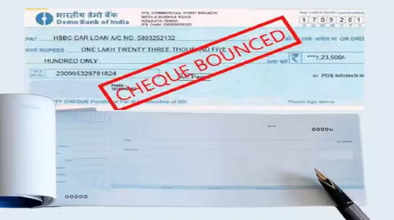If this mistake is not rectified after the Cheque bounce, then strict action can be taken against you, know the rules related to Cheque bounce.

In banking language, a check bounce is called a Dishonored Cheque. Check bounce may seem like a very minor thing to you, but according to Section 138 of the Negotiable Instrument Act 1881, the bounce of a check is considered a punishable offense.
After UPI and Net Banking, the use of checks has been limited, but its usefulness has still not ended. Even today, many people do big financial transactions through cheques. At the same time, in many works, a canceled check is demanded many times. Without this, your work cannot be done. However, while making a payment through a cheque, it should be filled out very carefully because your small mistake can cause the check to bounce. A bounced check means that the person who was supposed to get the money from that check could not get it.
In banking language, a check bounce is called a Dishonored Cheque. Check bounce may seem like a very minor thing to you, but according to Section 138 of the Negotiable Instrument Act 1881, the bounce of a check is considered a punishable offense. For this, there is a provision of two years imprisonment or fine or both. However, it is not that the check bounced and you were prosecuted. In such a situation, banks first give you a chance to correct this mistake. Let us tell you what are the reasons why a check bounces, how much fine is charged in such a case and when a case arises.
These are the reasons for check bounce
No or low balance in account
signature mismatch
spelling mistake
mistake in account number
over writing
check expiration
closure of check issuer's account
suspicion of forged check
No company stamp on check etc.
You get a chance to correct the mistake of check bounce
It does not happen that your check bounces and you are sued. If your check has bounced, the bank first informs you about it. After this, you have 3 months time in which you can give the second check to the creditor. If your second check also bounces then the creditor can take legal action against you.
Banks charge fine on check bounce
Banks charge a penalty if a check bounces. The fine has to be paid by the person who has issued the cheque.
This fine may vary depending on the reasons. For this, every bank has fixed a different amount. Generally, fine ranges from Rs 150 to Rs 750 or 800.
When does the case come?
Otherwise, as soon as the check is dishonored, a case is filed against the payer. When a check bounces, the bank first gives a receipt to the creditor, in which the reason for the check bounce is explained. After this the creditor can send a notice to the debtor within 30 days. If no response is received from the debtor within 15 days of the notice, the creditor can go to court. The creditor can file a complaint in the magistrate's court within a month. Even after this, if he does not get the amount from the debtor, he can file a case against him. If found guilty, imprisonment up to 2 years or fine or both can be imposed.

